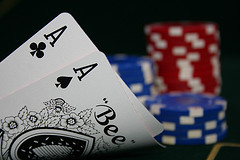 |
| Photo: Pxhere |
As poker rises in popularity, so does the number of ignorant players who just play for kicks. They disrupt the whole flow of the game and give it a lot of disrespect. A certain instance is when one says "bad fold, bad fold!" when he/she sees that the rather ragged flop has hit his/her hand. It is very annoying for all the players in the table and has cut off the bluffing element of the round since one has declared that he/she has one or two of the cards on the table.
Anyway, follow these basic guidelines of good behavior to ensure that the game is fair and enjoyable.
Don’t Talk About Your Cards after you’ve folded them
This is one of the most common breaches of etiquette that people do. Similar to the situation above, there might be instances wherein someone just bangs at the table and fusses over what a horrible fold he/she did. Again, it takes the life of the game and takes out some strategies that may be used on the round.
If You Want To Show Your Cards, Show It to Everyone
There are times when one asks an opponent to show their hand to them. Sometimes, they accede to the request and show it to them. But the problem is that they seem to keep it to themselves as a cute little secret. Don’t do that in a casino or even in a cash game. It annoys a lot of people. Keep the game fair for everyone.
Muck Your Hand Properly
There are lots of moments where one just throws their card like it was literally trash. Sometimes, the cards flip over and your hand will be shown to a few people who even cared about looking at you. Again, this takes out the element of fairness in the game because the other player may use this as a basis of calling or
folding given that card can’t possibly be a kicker for his/her opponent. So to speak, you’re wrecking the game for a couple of unknowing players. Keep things
formal and fold your hand properly by sliding it to the dealer using both hands.
Don’t Splash Your Chips
When betting, some people just toss in their chips, making a horrid splash that makes it difficult for the dealer to count. This takes up unnecessary time and drains all the energy of the round and disrupts the natural flow of the game. Bet properly by stacking your chips and sliding it over to the center of the table. Doing that shouldn’t be very difficult.
Pay Attention!
There are people who space out in the middle of the round and it takes a little nudge or a tilted eyebrow to get him/her back to earth. Don’t make everyone remind you it’s your turn, please. A lot of people take poker very seriously and a good number even gamble with this game as a profession. Respect the game, and you’ll get respect in return.
Conclusion
Honestly, if you want to be respected at the poker table. Don’t be a brat but be a mature person who loves to play the game. Minding your manners is a part of that. Actually, people shouldn’t even talk about this because it should be a customary task. And not only does it help you in the poker table, but also in life in general. Play the game properly and you’ll both get respect and admiration from your peers because of your class and love for the game.





